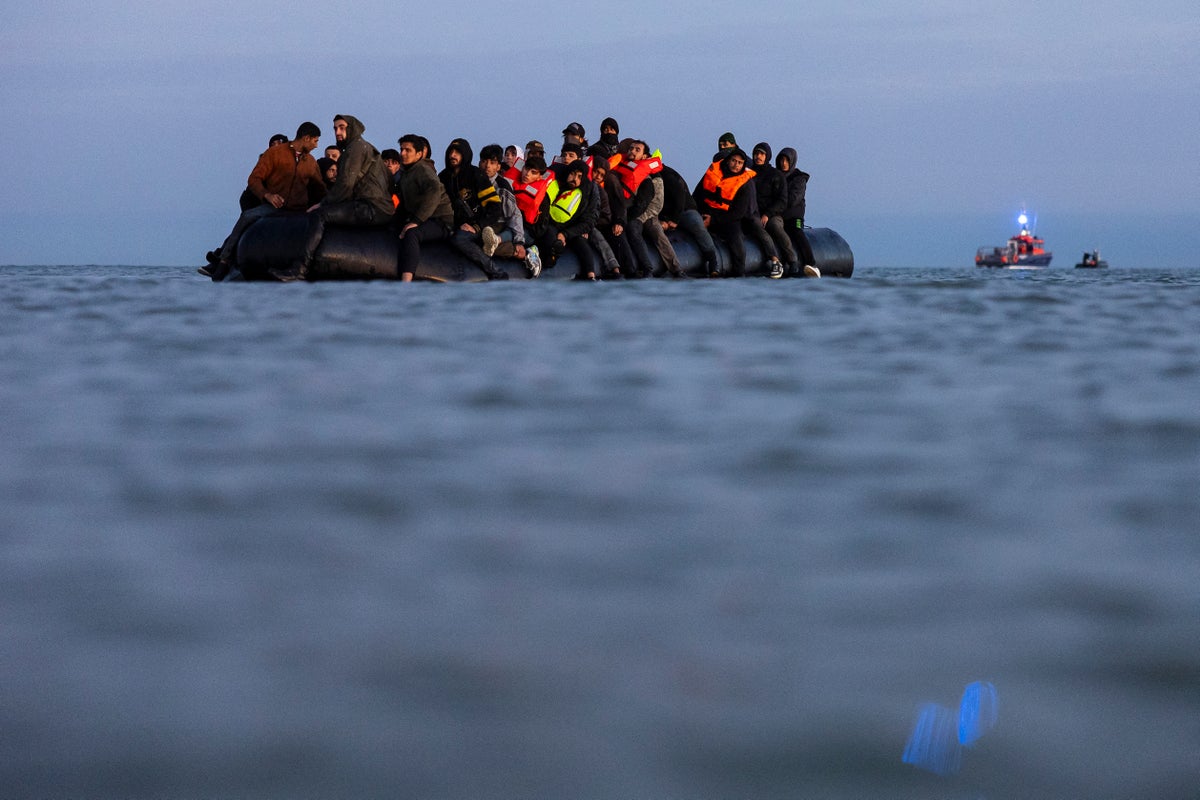“I would gently point out to Nigel Farage that before we left the EU we had a returns agreement with every country in the EU. He told the country it would make no difference if we left. He was wrong about that. These are Farage boats in many senses coming across the channel.”
That “gently” delivered salvo is only the latest in what might be called Keir Starmer’s “barrage Farage” campaign. It has the PM target Reform UK, its policies, its values and its personalities with unprecedented, sustained and ever more intense bombardment from Labour in the last few days, to the point where the Conservatives only got one jokey reference – “remember them?” – in the leader’s speech. Starmer, rather, chose to deploy the loaded phrase “Farage boats” during an interview with Christopher Chope, political editor of GB News, which is more or less Farage’s personal television channel.
The slogan “Farage boats” has its demerits. Farage was, after all, the one who first highlighted the phenomenon a few years ago on the aforementioned GB News, taking his own boats out into the Channel, filming the Border Patrol vessels unloading them at Dover and kicking up a fuss about it.
Yet it’s a potentially fruitful line of argument. Many of the UK’s current problems stem from something most of us would prefer not to dwell on – Brexit. Depressed investment, low productivity, stagnant economic growth and living standards, the strain on the public finances and thus public services, food prices, the “Boriswave” of more than two million (legal) immigrants, increased red tape and border hassles for businesses, farmers and travellers… all can be traced back, to a greater or lesser extent, to 2016 and the EU Referendum. And who, as he reminds us again now, spent 30 years of his life campaigning for Britain to leave the EU? Farage.
Starmer is correct up to a point. Before Brexit, a series of agreements on deporting migrants, the Dublin Regulation, did allow nations to send refugees back to the countries whence they first claimed asylum. This was rarely the UK, and so this country did send some back to France. However, that number tended to fall over time. On the other hand, the British were also obliged to accept more “family reunion” cases from the rest of the EU. It’s generally accepted that the regulation became less effective over time and, in any case, given that the vast majority of asylum seekers lodged their claims in Italy, Greece, Malta and Spain, it meant that those countries had to deal with an impossibly large number of people.
Outside the EU, the UK has lost access to the vast database associated with the regulations: Eurodac, or the European Asylum Dactyloscopy Database. It’s been running, silently, since 2003 and is, in plainer language, a fingerprint database. It’s currently used by all 27 members of the EU, plus Iceland, Norway, Switzerland and Liechtenstein. But not, since Brexit, Britain, because the UK and the EU haven’t been able to reach a wider data-sharing agreement.
If British authorities still had access to it, they could reliably determine whether any given asylum seeker who shows up at Dover or Heathrow has previously been denied refugee status almost anywhere else in Europe. The more data that authorities have, the more chance they have to successfully reject invalid claims the moment they are made.
The upshot of this is that Brexit means that asylum seekers can have “another bite at the cherry” – having failed in France or Germany, say, they can have another go once they’ve made it to British territorial waters or overstayed on a visa. Given that the migrant crisis is undeniably a Europe-wide problem, Britain would also have a say and could indeed play a role in securing the EU’s southern border. After all, the flows across the English Channel are in reality just a proportion of those across the Mediterranean with a time lag.
The problem – evident here – is that explaining why Farage has helped drive immigration higher takes time and effort.
Still, the argument and the broader point are worth persisting with. That doesn’t mean Starmer has to commit to rejoining the EU; a project, presumably requiring another referendum, a prospect which will energise few who remember how the last one tore this country in two. It is merely to make the clear and obvious point that Farage has little of substance to trumpet regarding his one great political achievement. It is he, Farage, who “broke Britain” with Brexit and is now, outrageously, capitalising on the vast damage he caused.
No need to mention the “R” word, it’s the “B” word for Brexit that is Nigel’s greatest embarrassment. Or should be.
